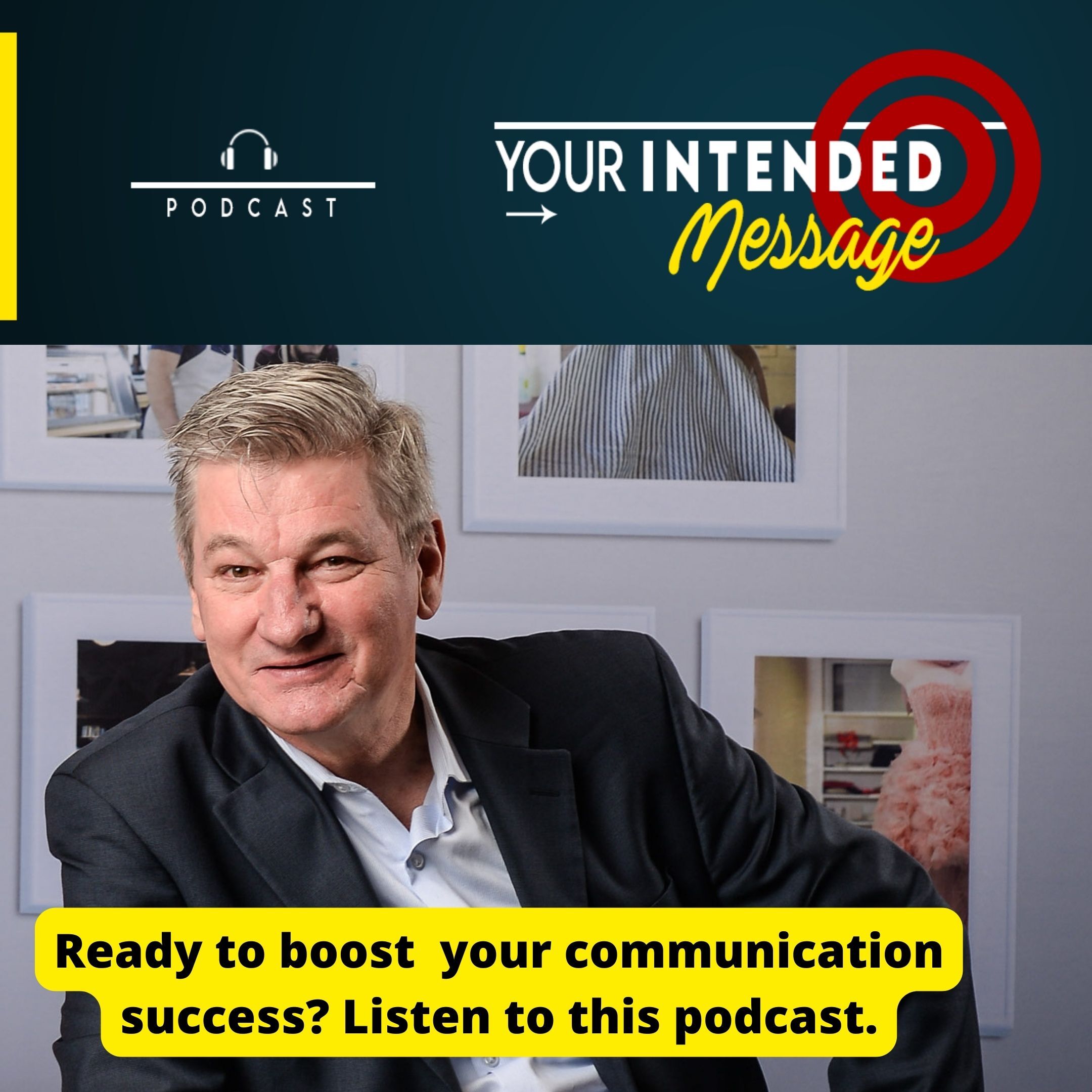
17.5K
Downloads
292
Episodes
The podcast about Effective Communication in Business
Better communication skills will advance your career and business. Are you ready to enhance your understanding and results from better communication? Listen and learn how to deliver Your Intended Message.
Are you willing to cross-examine communication from various perspectives? Would you like to deliver your intended message more effectively?
Listen to Your Intended Message to gain a powerful advantage in your ability to convey your message to your audience, team, clients or marketplace.
Learn from the mistakes and success of communication experts from around the world from different scenarios.
The better communicator has the competitive advantage.
Imagine what that means to you when you improve the success of your next conversation, presentation or message.
Your Host - George Torok
https://yourintendedmessage.com/
The podcast about Effective Communication in Business
Better communication skills will advance your career and business. Are you ready to enhance your understanding and results from better communication? Listen and learn how to deliver Your Intended Message.
Are you willing to cross-examine communication from various perspectives? Would you like to deliver your intended message more effectively?
Listen to Your Intended Message to gain a powerful advantage in your ability to convey your message to your audience, team, clients or marketplace.
Learn from the mistakes and success of communication experts from around the world from different scenarios.
The better communicator has the competitive advantage.
Imagine what that means to you when you improve the success of your next conversation, presentation or message.
Your Host - George Torok
Episodes
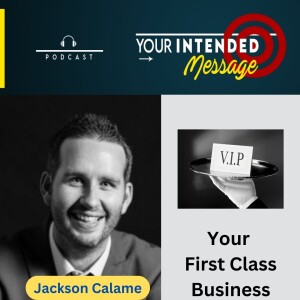
Thursday Nov 28, 2024
Build a First Class Business: Jackson Calame
Thursday Nov 28, 2024
Thursday Nov 28, 2024
How to Build an Elite Team for Your Business
Your Batman needs an Alfred
Episode 232 (Jackson is based in San Antonio, Texas)
In this conversation with Jackson Calame we explore the keys to building a first-class business and the foundational principles for entrepreneurial success."
- Why first-class service is non-negotiable for thriving businesses.
- The hidden power of infrastructure and why it’s often overlooked by entrepreneurs.
- How to transition from solopreneur to team leader and scale effectively.
- The critical role of assembling the right team and identifying visionary traits in business partners.
- The importance of ethics and authenticity in sustainable business growth.
- The combine approach to selecting elite talent, inspired by professional sports.
- Balancing efficiency with customer experience to create raving fans.
- Why relying solely on automation and AI can be risky without a clear communication strategy.
- Aligning personal values with business goals to create meaningful success.
- How intentional messaging and clear communication set businesses apart from competitors.
-----
About our guest, Jackson Calame:
Jackson teaches visionary entrepreneurs how to unlock sustainable revenue growth and expand their legacy by becoming a Power Brand in their market. 96% of businesses fail within the first 10 years. Jackson teaches businesses, not only how to avoid failure, but how to win, by becoming a true leader in their market.
You are invited to attend the Power Launch Webinar.
https://go.firstclassbusiness.io/power-launch-webinar
-----
Excerpts from this conversation with Jackson Calame:
Jackson, let's talk about what first class business does for entrepreneurs that entrepreneurs fail to do for themselves. Where do you start? Absolutely.
Well, come out hitting hard and heavy. So our tagline on our website may make a lot of you laugh in a good and appreciative way.
It says, Hey, Batman, let us be your Alfred, right? And what does that mean? That means one, we want to work with superheroes, people who are contenders in the market, not pretenders.
We also want to come in and provide all of that back end infrastructure that often gets overlooked, maintaining the house, maintaining the balance, making sure that the schedules are operating efficiently, making sure Batman doesn't go out there and die when I was just trying to save the world.
There's so many things that need to be done in order to truly help somebody scale and have a proper balance and serve their market and be there for the family and the whole it's a lot so many entrepreneurs either take that for granted on one side, and we've got to stop doing that if we really want to build.
Or on the other side, if you're the Batman listening into that right now and you're like, oh my gosh, I need that act on it, you know, start looking for who is going to help you build that really unsexy, boring thing that almost no podcasts talk about, called infrastructure, truly that simple infrastructure
-----
First Class business means that we literally cannot provide a second class service. Our clients won't accept it.
-----
Read the rest of this entry »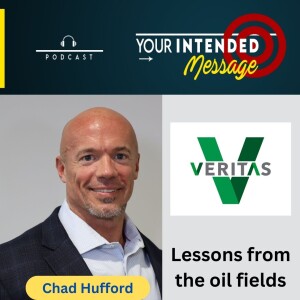
Thursday Nov 21, 2024
The Power of Analogies in Financial Planning: Chad Hufford
Thursday Nov 21, 2024
Thursday Nov 21, 2024
7 Life Lessons from Oilfields to Retirement
How Emotional Baggage Impacts Your Finances
Episode 231 (Chad is based in Alaska)
In this conversation with Chad Hufford we explore:
- Why Conventional Wisdom Often Fails in Financial Success
- The Role of Emotional Baggage in Financial Decision-Making
- The Influence of Financial Media on Misconceptions
- The Importance of Shifting Perspectives for Financial Independence
- Building a Financial Blueprint for Success
- The Difference Between Income and Principal in Financial Freedom
- Focusing on What You Can Control in a Volatile Economy
- The Role of Trust and Relationships in Financial Advising
- Retiring To, Not From: The Importance of Purpose in Financial Independence
- The Power of Analogies to Simplify Complex Financial Concepts
About our guest, Chad Hufford:
Chad owns a boutique financial planning firm, Vertitas Wealth Management. He partners with Dave Ramsey as one of his SmartVestor Pros. He is the author of Forging Financial Freedom. He is born and raised in Anchorage, Alaska.
You can get your copy of his book along with the free bonuses here
www.forgingfinancialfreedom.com
-----
Excerpts from this conversation with Chad Hufford:
Delighted to be talking with you and I somehow I just think just living and growing up in Alaska is got to give you a different view of the world. Do you agree with that?
Well, quite literally, it gives me a different view of the world. We're so high up on latitude that, yeah, every everything's different up here. But, you know, I think it's been actually really powerful for me.
You know, one of the things we talked about in previous conversations is, you know, when we try to have an intended message come across, sometimes we do have to change somebody's perspective in order to see it clearly.
And I think, coming from Alaska, we do automatically have such a different perspective. It just It lends itself to the reframing or reshaping of somebody's paradigm or perspective, and it's just, it's a wonderful place to live. It's not always easy 35 degrees this morning on my drive into the office.
But you know what? It's beautiful, and it's home- and that's 35 degrees Fahrenheit.
I guess we just started the fall, ended this summer? Yeah, summer here ended a few weeks ago, I think, if we're being honest. But yeah, 35 degrees Fahrenheit.
So like one, one degree, two degrees Celsius, it's, it's, it's crisp out there. But you know what we had? We had a huge black bear come through our yard. The other day.
We had a lynx outside. And where we live in Anchorage. it's 300,000 people. It's a normal town. We're now out in the boonies, but we live on the very edge of Anchorage, so we get wildlife in our backyard all the time. And it's such a blessing.
-----
Read the rest of this entry »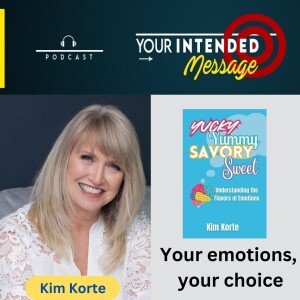
Thursday Nov 14, 2024
How to take control of your emotional reactions: Kim Korte
Thursday Nov 14, 2024
Thursday Nov 14, 2024
The Recipe of Emotions: Crafting Responses for Success
Emotion as Sensation: How Our Past Shapes Our Emotional Responses
Episode 230 (Kim is based in San Francisco)
In this conversation we explore:
- The Connection Between Emotions and Sensory Experiences
- Why Emotional Awareness Matters in Both Life and Leadership
- Practical Strategies to Gain Control Over Your Emotions
- How to Avoid Being a ‘Slave’ to Your Emotions
- The Power of Emotional Granularity
- Using Interoception to Improve Emotional and Physical Awareness
- How to Rethink Negative Experiences Through Conscious Reframing
- Balancing Compassion and Empathy as a Leader
- Daily Practices to Connect with Your Emotions
- How Emotions Serve as Tools for Learning and Growth
About our guest, Kim Korte:
Kim Korte hosts the Flavors of Emotions podcast and is the author of Yucky Yummy Savory Sweet: Understanding the Flavors of Emotions.
She offers a process to help us make sense of our feelings through the lens of a chef understanding flavors in a recipe.
This unique approach to emotion management blends culinary metaphors with emotional education in a digestible format, making the complex world of feelings accessible and actionable.
As a Sensory Perception and Emotion Management Strategist, she aims to help people develop creative action around how they experience the world and their emotions.
Learn more about Kim and and her book https://www.kimkorte.com/
Listen to her podcast "Flavors of Emotions: https://www.flavorsofemotions.com/
-----
Excerpts from this conversation with Kim Korte:
In your book, you compare emotions to food and and sensation. Food sensations and flavors. How did you come up with that connection?
I learned about the theory of constructed emotions, which is a very common and probably fairly widely accepted idea that we construct our emotions using our experiences, kind of like ingredients that and a recipe.
And I got this idea after reading how emotions are made, The Secret Life of the Brain, by Lisa Feldman Barrett.
It was an eye popping book, and it got me to think about how if emotions are created from perceptions, then our whole world is like giving us ingredients that we use, and the recipes are everything that we've experienced previously.
So we're always living today in the past, unless we're more conscious of what's going on in our current experience.
That level of consciousness is what helps us to examine and change the quote, unquote recipe if it's not the right one, or if it's not working for us and the process of flavor, it's not a sense sensory system, like everything that we taste, everything we see, all of these things, these are sensory systems.
And taste is a combination of sensory systems you taste with your nose, you taste with your mouth. They even have shown that what you see and what you hear like, if it's crunchy, you think it's fresh, but even music going on around you, you might think, Oh, this music isn't impacting me, but it really can impact the flavor and your experience of food, and the same is true of our emotions.
Everything that we experience is a our emotions, rather are a combination of our sensory experiences. That's what influences us. So this is where I got these food metaphors and cooking metaphors.
-----
Think of it like a pepper. There's different kinds of peppers, there's bell peppers, and there's jalapenos, and there's habaneros.
And yet, we don't attribute hot spiciness to every single pepper out there, right? Because we've learned to distinguish the differences situationally and. Experientially of different peppers.
And so the same can be true with our fears, because we tend to have this like one size fits all approach to a lot of emotions, and we we feel one emotion more than others, and we haven't allowed ourselves to recognize that fear can be like a pepper, even love can be like a pepper, and have different gradations of it, different levels of quote, unquote, heat.
And with that, you are able to break down that fear into seeing it in its different states. It could be irked, could be nervous. It could be irate, you know? It could be, you know, I need to run for the door, panic. Same with love....
-----
Read the rest of this entry »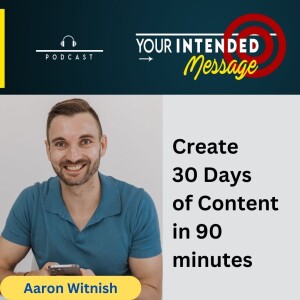
Thursday Nov 07, 2024
Create and Publish Real and Trustworthy Content: Aaron Witnish
Thursday Nov 07, 2024
Thursday Nov 07, 2024
Unlocking Trust and Authenticity in Content Creation
Build Real Connections and Grow Your Business
Episode 229 (Aaron is based in Australia)
In this conversation with Aaron we explore:
- The value of publishing video to build trust
- Publish content to offer value to your prospects and clients
- Why the content needs to be about your audience and not you
- How to discover the questions that your audiences wants answered
- How to generate better content by answering questions
- How to appear better on camera by making it a conversation
- How to get into the flow of recording video
- The importance of an attractive hook to hold their attention
- When and how to place a call to action
About our guest, Aaron Witnish:
He started marketing online in 2008 and launched his first agency in 2010.
You can download the free "30 Days in 90 Minutes Content Creation System"
-----
Excerpts from this conversation with Aaron Witnish:
It's very fitting that the show is called your intended message, because that ties in beautifully with content creation. The challenge is it has so many moving parts.
Where do you post it? What format do you create? Where do you get the ideas, what tech that you use? And that paralyzes most people into inaction, or there's a fear about being on camera. You're quite vulnerable. When you put yourself online, people can make comments and say things.
-----
When you're writing your content, creating it, or just thinking about what you're going to say, think about your audience and how you can help them.
-----
How do we know which questions to answer for our audience?
This is one of the biggest obstacles, and I'm glad to say that solving it is quite easy once you know how and full transparency.
Took me 14 years to to find this, and now that I know it's kind of slapped me in the face, but what you do is you take any topic that you might cover with your intended message or in your business, and you just put that keyword or that search into Google.
So let's use a generic example, and we'll say weight loss. So if you put weight loss, type it into Google. Press Enter. All you need to do is scroll down the search a little bit, and there's a section that says people also ask, and that'll have the questions and queries that people are typing in and asking online.
So what you can do is look at the questions that you can add value to and answer, save them to the side, and then you click the down arrow, it'll give you more questions.
You click the down arrow, it'll give you more questions. Then you just take the next topic. So it could be dieting, it could be workouts, it could be nutrition, and then you just keep getting a list of questions that people are asking.
So that way you know what people are searching for online, and you can solve those problems with your content and never. Run out of content ideas with this strategy
-----
Read the rest of this entry »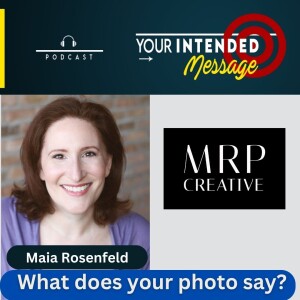
Saturday Nov 02, 2024
What does your photo say about you? Maia Rosenfeld
Saturday Nov 02, 2024
Saturday Nov 02, 2024
Is your image telling your story as intended?
How to look better and real on camera
Episode 228 (Maia is based in Chicago)
In this conversation with Maia Rosenfeld we explore:
- How do other judge you based on your photograph?
- How a photographer first needs to understand you
- How to stop sabotaging your photographs
- What a better word than "cheese"
- The power of visual messages on trust
- The first impression when we see your photo on Linkedin
- How might the photograph convey your brand?
- Why do people check their reflection when they walk by store windows
About our guest, Maia Rosenfeld:
Maia has been a headshot photographer in Chicago, Los Angeles and New York for 28 years.
Some of her corporate clients include BMW, J.P. Morgan Chase, Salesforce, GE Healthcare and The Make-A-Wish Foundation.
She's never met a stranger.
Learn more about her photography services at
-----
Excerpts from this conversation with Maia Rosenfeld:
Is it welcoming? Do you look smart? Do you look like you're good at what you do? Do you look like someone they want to spend the time reading the next little blurb that's probably only three sentences underneath their chin, getting to figure out what is the unique thing, the differentiator of each client that comes into my studio to figure out how to tell their story, to make sure that their authenticity is represented, is the thing right.
-----
I'm not particularly interested in taking photographs of what you look like. Lucky for me, you already look like what you look like. Thank you very much. I'm interested in taking photos of who you are.
-----
I've come up with a game that they do, which is I throw a word out at them, and they just repeat that word inside their brain. They just have to think it.
So if I say to you, just with your eyes, say the word power, if you literally just think the word power, you're done. You don't have to give me what you think a powerful look is.
You don't have to define power. You don't have to think of a ton you once felt powerful. Literally, I say power. You say power. I say cat, you say cat. And why does it work?
It works because it keeps George inside the building. That is George, where people tend to derail themselves in photos, any photo, family photo, picture, it out with your friends.
Is the second the camera comes up. Everyone tends to leave the building, right? We're in a big group of people. We say cheese. We don't know how long it's taking. We don't know how many they're taking.
Our faces kind of freeze. We don't know it's, oh, it's the other camera. Are they using a flash? We get that photo back, and we hate how we look, right? You're not in that photo.
You left at least 15 seconds ago, right? So that is one of the places that we derail ourselves and we don't we start to hate how we look.
Now we live in a world, in this selfie culture, where you can watch yourself in the photo, right? Which is almost even worse of a problem. It makes it even more self conscious, right?
-----
Read the rest of this entry »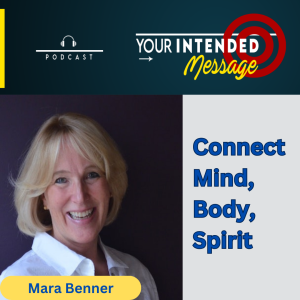
Thursday Oct 17, 2024
Mind, Body and Spirit Connection: Mara Benner
Thursday Oct 17, 2024
Thursday Oct 17, 2024
Listen to your Mind, Body and Spirit
Your Body is a Team Player
Episode 227 (Mara is based in Virginia, USA)
In this conversation with Mara Benner we explore:
- How to better connect with our own body, mind and spirit
- Why outside communication starts with inside communication
- Emotional intelligence is more than only emotions and intelligence
- How to prepare yourself for challenging conversation
- How to mitigate imposter syndrome
- How to balance body, mind and spirit
- How are we communicating to ourselves
About our guest, Mara Benner:
Mara worked for 25 years in corporate and nonprofit leadership roles. At one time she worked for the CEO of a $2 billion healthcare company.
She has learned how various cultures have combined health, wellness and the min-body-spirit connection.
She studied Qigong in China with the masters.
You can arrange for a 30 minute, no-charge, no-obligation consultation with Mara at https://truenorthexecutivecoaching.com/
-----
Excerpts from this conversation with Mara Benner:
Your body is a team player with you. And when I say that to leaders, there's a pause. There's that ache that I've been having, that pain that I've been having. I didn't think of as the body being a team player with me, but it is, and you can get to optimal performance, mind, body and spirit when you work on all these different aspects.
-----
And I'll say one other thing that I think is fascinating about this is those leaders who have done an amazing job of working on the mind, body and spirit, also tap into the ability to create at a whole new level, for innovation and for new approaches, and with time speeding up on how quickly companies have to move and engage in new, innovative approaches for products or services, that ability as a leader, to tap into that creative aspect for the vision of the company and the organization is more important than ever.
-----
But we come back to a state of homeostasis, which is our natural place to be. And when we're balanced, when our mind and body and spirit are all in a balanced state, the body is able to optimally heal and be at optimal performance, which helps a leader out.
And so again, whether it's yoga or Qigong, or any of these approaches meditation, but it could be also, and this is what I think is really interesting, is for every leader, it's very different as to how they best come back into the state of homeostasis.
So for some it might be going for a run that helps them come back to that state of true balance. When I was in China to go to your point, what I realized is this concept that has always been there of what we call whole person care, which is we are not separated.
Our bodies aren't separated from our mind. Aren't separated from our spirit. It's all one in the same. And we get used to in our healthcare culture right now, we get used to thinking that things are separated out, that one does not impact the other, and that's actually not true.
They're all completely part of the whole so when a doctor says to a patient, this is this illness is stress related, often that person walks out of the doctor's office and may not know what to do with that, like, what? So now do I do if it's stress related? What does that look like?
-----
Read the rest of this entry »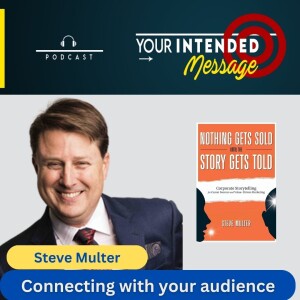
Thursday Oct 10, 2024
Storytelling for Career Success: Steve Multer
Thursday Oct 10, 2024
Thursday Oct 10, 2024
How to connect with your audience
Episode 226 (Steve is based in Chicago)
In this conversation with Steve Multer we explore:
- The challenge of an American speaking to international audiences
- How to adapt your delivery to the audience
- How to enter the conversation on their terms
- The role of inner and out status when connecting
- The three levels of value that we can invest in others
- How to boost your self esteem by associating with smart people
- How to judge the value of your message
- The danger of reading your script instead of adapting
- The balance of pathos, logos and ethos
About our guest, Steve Multer:
Steve had delivered presentations to executive teams for over 125 brands in 38 states and 25 countries.
He is the author of "Nothing Gets Sold Until the Story Gets Told" Corporate Storytelling for Career Success and Value-Driven Marketing.
Learn more about Steve's services and his book at
https://corporatestorytelling.com/
-----
Excerpts from this conversation with Steve Multer:
You walk into a room, you need to know how to read that space and do it in real time. In order to create a winning communication environment. You have to enter on their terms. You have to enter in a space that they feel comfortable and confident with. Because if you don't, you lose every time.
-----
They're investing in you, like you're investing in them, right? I think that is such a strong concept.
I frequently say to people when they're not sure they're being properly compensated for business. I always say, think about it this way. You are not having to pay for a master's degree in whatever it is that you're working on.
There are many, many ways to get paid. When you talk about the three levels of value, right? When we talk about fiscal value, we talk about psychological value, and we talk about calendar value, the three things that we can invest in, a person, in an idea, in a human to human engagement.
Again, this is whether we're giving a presentation to an arena full of 10,000 people, or speaking one on one with a colleague, a team member, a executive leader, a customer.
There are three things that we can invest in them. We can invest our time in them. Are they or are they not worthy of our time? We can invest our money in them. Is this or is this not worth paying for out of my wallet?
Or we can invest our psychology in them. Is my time and money worth what I will gain from the nature of the engagement, from the message that I'm about to give and the message hopefully I'm about to receive from the person that I'm with.
All three of those investments have extraordinary value.
-----
Read the rest of this entry »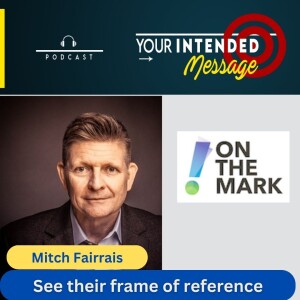
Thursday Oct 03, 2024
Understand their Frame of Reference: Mitch Fairrais
Thursday Oct 03, 2024
Thursday Oct 03, 2024
Do you understand their frame of reference?
Your Frame of reference is not their frame of reference
Episode 225 (Mitch is based in Oakville, Canada)
In this conversation with Mitch Fairrais we explore:
- Understanding our frame of reference and how it was formed
- The challenge of stepping into the frame of others
- The difference between a dialogue and the monologue
- How can you understand their reality
- How to explore their reality without attacking them
- Why and how to hear their voice
- Encouraging phrases to use with your team
- Recognize your inclination to judge and how to put that on hold
- The role of leadership vulnerability
- The danger of believing in all your "shoulds"
About our guest, Mitch Fairrais:
Mitch works with senior leadership teams to help them develop their communication and leadership skills.
He holds a high level of skepticism about many aspects of conventional corporate wisdom.
He is a founder of Socks for Souls Canada, a non-profit that provides unhoused people with warmth, comfort, dignity, mobility and health through new socks.
You can learn more about his training and coaching programs at:
-----
Excerpts from this conversation with Mitch Fairrais:
You and I, and every leader on the planet lives with some level of being very much caught in their own frame of reference.
Our own upbringing, our own algorithms that have caused us success. How we've dealt with things, our own beliefs, our own values. There are a number of things that each of us comes to any circumstance with and any interaction with, and it's our frame of reference that we cling to, because it's all we know.
And it's very difficult for most human beings to actually step into the frame of reference of others, which, if you ask me, is the single most important skill that any leader could possess, beyond basic language skills or some math skills, some basic skills like that.
-----
Anyone who says to me, "I know how you feel" if I am 1000 human beings out of 1000 human beings being pulled I'm saying I doubt it. I don't think you do.
And for anyone to even suggest that they get how someone else views the world is almost ludicrous, because our frames of reference are so different that odds are, if I'm wise,
I should go in assuming that your frame of reference is going to be wildly different than mine, because you've grown up differently, you know, maybe have come from a different family background, maybe different part of the world than I know, many different things.
And I should assume as a starting point I have no idea what your frame of reference is, unless we've got lots of history. Even then, I want to on any given circumstance, on any given issue, explore what your views are, how you feel about how you're looking at anything that we are talking about in any given moment, even if I've known you for the last 20 years.
-----
Read the rest of this entry »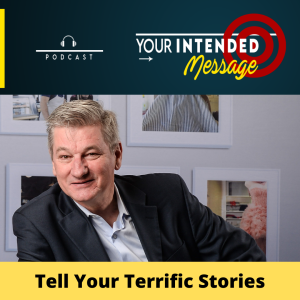
Thursday Sep 26, 2024
Tell Your Terrific Stories: George Torok
Thursday Sep 26, 2024
Thursday Sep 26, 2024
How can you use stories to convey your message
Tips to tell your stories
Your host, George Torok tells you the three part formula to deliver an effective story.
Then you hear two stories from him, one a business story and the other a personal story. They're both effective when you understand your purpose.
George analyzes each story to point out the key parts and techniques to craft and deliver your stories successfully.
Episode 224
In this solo episode with George Torok, we explore:
- The power of storytelling in business communication
- How to find and craft compelling stories
- Three key elements of a successful story
- Using personal anecdotes to connect with your audience
- Common mistakes to avoid when telling a story
Key Takeaways:
- Practice crafting stories that are concise and relevant to your audience.
- Engage your audience with an intriguing opening question or bold statement.
- Use visuals and emotions in your stories to make them memorable.
"When you tell stories about yourself, don't make yourself the hero all the time. Occasionally, maybe, but not all the time, because then you sound self-centered, and it's hard to connect with you."
"The best stories plant visuals in the mind of your listeners and touch their emotions."
Guests of Your Intended Message who discussed story telling:
Graham Brown: 3-box Story Telling Episode 68
Bruce Scheer: Inspire your buyers with the right narrative Ep 171
Richard Rosser: How to leverage AI to tell your story EP 170
Alan McLaren: Story telling to build your leadership brand EP 108
Robert Tighe: Find and tell your origin story Ep 91
-----
Read the rest of this entry »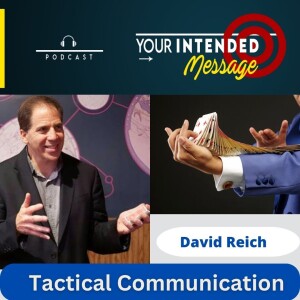
Friday Sep 20, 2024
Tactical Communication Skills: David Reich
Friday Sep 20, 2024
Friday Sep 20, 2024
Communication secrets from magic and hypnotism
How to better connect with people you don't know yet
Episode 210 republished (David is based in Boston)
In this conversation with David Reich we explore:
- Magic skills that enhance your communications
- The importance of observing your audience
- How to watch where people's eyes are
- Why you need to break the pattern
- How to find common ground
- Magic phrases to boost the connection
- How to influence decisions
- Understanding the perception and motivation of the audience
- Why you don't need care about who gets credit
- How to adapt when the magic trick doesn't work
About our guest, David Reich:
David has had a successful career as a technology and thought leader, and combines that with his passion and talent as a magician, mentalist and stage hypnotist, to create unique experiences of Entertainment, Education and Enlightenment.
David discovered how the principles of a mystery performer can be used to become an overall better communicator, and more specifically, he has developed the Tactical Communication Method.
Learn mor about David Reich and his services at his website https://davidreich.com/
Get your free copy of the Seven Tools of Tactical Communication
https://davidreich.com/tacticalcommunication/
-----
Excerpts from this conversation with David Reich:
Action Items
- Practice observation techniques to understand how messages are landing and tailor communication accordingly.
- Use phrases like "help me understand" instead of disagreeing to have constructive discussions.
- Focus on being authentic, candid and vulnerable in conversations rather than putting on airs.
-----
The biggest key really is observation.
We have to look at other people, we have messages, we have things we want to say, we want to sell an idea, we want to convey a joke, we want to tell.
And we have to not only know what we want to say, but how it's landing. And that's actually how I came up with this whole tactical communication method.
Because as a magician as a mentalist, as you're going through your performance and your communication, you need to see how things are landing where people's eyes are.
And if it's working, and if it's not. And then and this, this takes a bit of practice, okay, can't do it overnight, just like anything good requires a bit of practice.
But you can start to tailor your message and tailor how you're communicating real time on the fly, to make your message resonate. And that's how you get people to want to hear what you have to say.
-----
Read the rest of this entry »